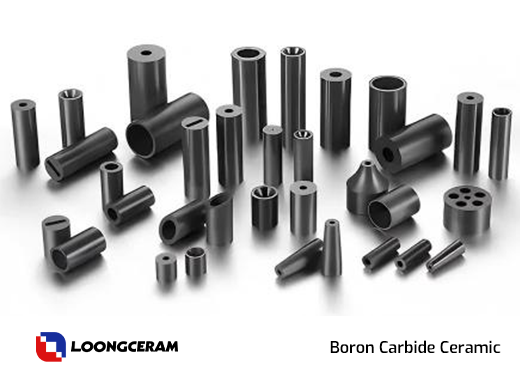Boron Carbide B₄C
Boron Carbide Ceramic
Boron carbide (B4C), also known as black diamond, is the third hardest material after diamond and cubic boron nitride. Due to its excellent performance combination, it has become an ideal material for many high-performance applications. Its outstanding hardness makes it an ideal abrasive powder for grinding, polishing and water jet cutting of metals and ceramics. Its low specific gravity, high hardness and reasonable toughness make it an ideal material for vehicle bodies and vehicle armor. Boron carbide is also widely used as control rods, shielding materials and neutron detectors in nuclear reactors because it can absorb neutrons without forming long-lived radionuclides. As boron carbide is a P-type semiconductor, it can be a suitable candidate material for electronic devices that operate at high temperatures. Boron carbide is also an excellent P-type thermoelectric material.

Advantages
- High hardness
- Low density
- High melting point
- High elastic modulus
- Chemical inertness
- High neutron absorption cross-section
- Excellent thermoelectric properties
Material Properties
Mechanical Properties
| Property | Unit | Boron Carbide (B4C) | DuraWear (B4C+SiC) | DuraShock (SiC+B4C) |
|---|---|---|---|---|
| Density | g/cm3 | 2.52 | 2.62 | 2.8 |
| Hardness | GPa | 33 | 31 | 28 |
| Fracture Toughness KIc 1 | MPa m2 | 2.5 | 3.4 | 4 |
| Compressive Strength | MPa | 3000 | 2900 | 2500 |
| Flexural Strength @ 25°C | MPa | 420 | 340 | 330 |
1 KIc Toughness as measured by the indentation method.
Disclaimer: The values presented are mean and typical of those resulted from test samples. They are provided as an indication only to serve as guidance in the design of ceramic components and are not guaranteed in any way. The actual values can vary according to the shape and size of the envisioned component.
Boron Carbide Machining
Boron carbide can be processed in green, raw, or fully dense states. Boron carbide can be relatively easily processed into complex geometric shapes in its raw or billet state. However, the sintering process required to fully densify the material will result in a shrinkage of approximately 20% in the boron carbide body. This shrinkage means that very strict tolerances cannot be maintained when processing boron carbide before sintering. In order to achieve very strict tolerances, diamond tools must be used to process/grind fully sintered materials. During this process, very precise diamond coated tools/grinding wheels are used to grind the material until the desired shape is formed.
Product application
DuraShock and DuraWear are new ranges of boron carbide-based ceramic composites. They are manufactured ‘in-house’ and are ideal for applications where high hardness, impact resistance, and tolerance to abrasive wear is required.
Classified by purity